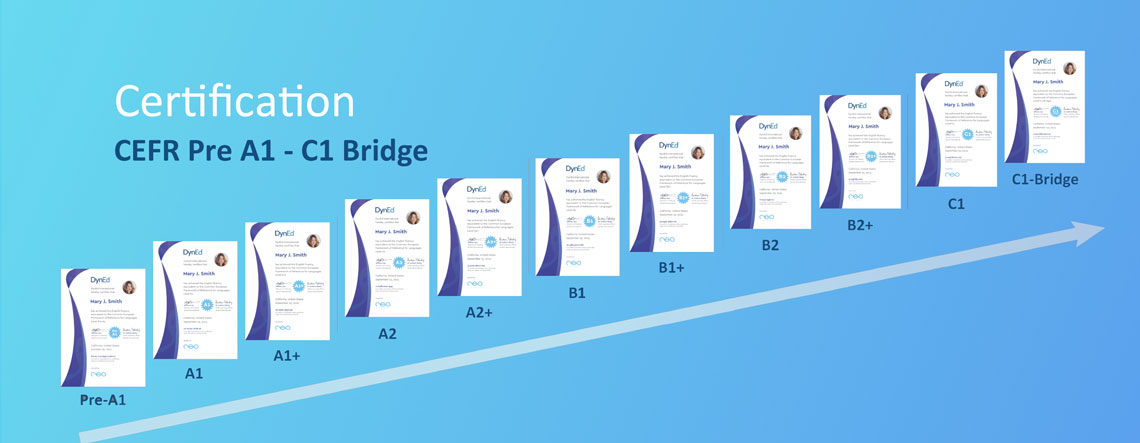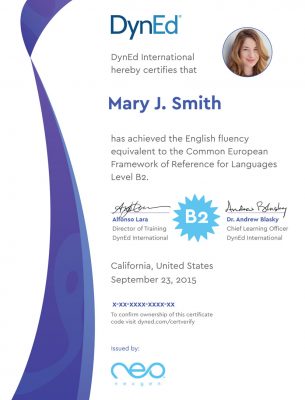
The neo Certifications
The neo Certifications are systems for recognizing and confirming student proficiency levels in English. It is based on the Common European Framework of Reference for Languages (CEFR), an internationally respected system for describing language levels developed by the Council of Europe. CEFR proficiency levels underlie many major tests, including the TOEFL, TOEIC, IELTS and Cambridge exams, and are increasingly referenced by Ministries of Education around the world in setting the goals and standards of the national English language curriculums.
neo has amassed over 35 years of detailed data covering student study behaviour, rates of progress, and test results. This data forms the foundation by which neo Certificates have been aligned to the CEFR. neo can now provide students with even clearer goals, as well as internationally recognized Certification of their achievements.
CEFR Certification Level Descriptions

Can understand the most basic conversations and personal information. Can express greetings and ask basic questions. Can express and understand statements in the simple or continuous present, if spoken slowly and carefully. Can express and understand basic numbers and letters.

Can understand and use familiar everyday expressions and very basic phrases. Can introduce themselves and others and can ask and answer questions about personal details such as where people live, who they know and things they have. Can interact in a simple way provided the other person talks slowly and clearly.

Can understand what is being said if people speak slowly and carefully with occasional pauses. Can answer simple questions using individual words, expressions or short sentences. Can express likes and dislikes. Can express or ask someone the day of the week, the date and the time.

Can understand sentences and frequently used expressions related to areas of most immediate relevance. Can communicate in basic and routine tasks requiring a simple and direct exchange of information on familiar and routine matters. Can describe in simple terms aspects of their background and immediate environment.

Can understand short, simple texts containing the highest frequency vocabulary, including a proportion of shared international vocabulary items. Can discuss everyday practical issues in a simple way when addressed clearly, slowly and directly. Can discuss what to do, where to go and make arrangements to meet.

Can understand the main points of clear, standard input on familiar matters encountered in work, school and leisure. Can communicate on topics, which are familiar or of personal interest. Can describe experiences and events, dreams, hopes and ambitions and briefly give reasons and explanations for opinions and plans.

Can understand the main points of clear standard speech on familiar matters regularly encountered in work, school, leisure etc., including short narratives. Can communicate the main message, limited to what they can recall or find the means to express. Can briefly give reasons and explanations for opinions, plans and actions.

Can understand the main ideas of complex text on both concrete and abstract topics. Can interact with a degree of fluency and spontaneity that makes regular interaction with native speakers quite possible. Can produce clear, detailed descriptions on a wide range of subjects and explain a detailed viewpoint on topical issues.

Can with some effort keep up with an animated conversation between native speakers. Can give clear, detailed descriptions and presentations on a wide range of subjects related to his/her field of interest, expanding and supporting ideas with subsidiary points and relevant examples.

Can understand demanding, longer texts, and recognise implicit meaning. Can express themselves fluently and spontaneously. Can use language flexibly and effectively for social and academic purposes. Can produce clear, well-structured, detailed text on complex subjects using organisational patterns, connectors and cohesive devices.

Can express and understand complex topics outside of their area of expertise. Can follow and engage in complex discussions where the meaning is implied rather than directly stated. Maintains a high degree of grammatical accuracy with only rare errors. Can conduct nuanced debate with an almost consistently smooth flow of language.

Can easily understand virtually everything heard or read. Can summarise information from different spoken and written sources, reconstructing arguments and accounts in a coherent presentation. Can express themselves spontaneously, very fluently and precisely, differentiating finer shades of meaning in complex situations.
neo’s CEFR Certificates

Universal Unique Identifier
Each neo Certificate has a Universal Unique Identifier code at the bottom that provides employers and university recruiters with a simple way to confirm its authenticity. To confirm that a student has been certified by DynEd, simply visit www.dyned.com/certverify and enter the requested information about the student to see a copy of any Certificates they’ve earned.
